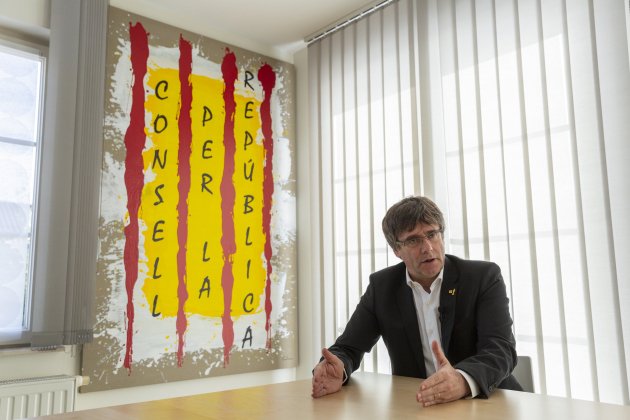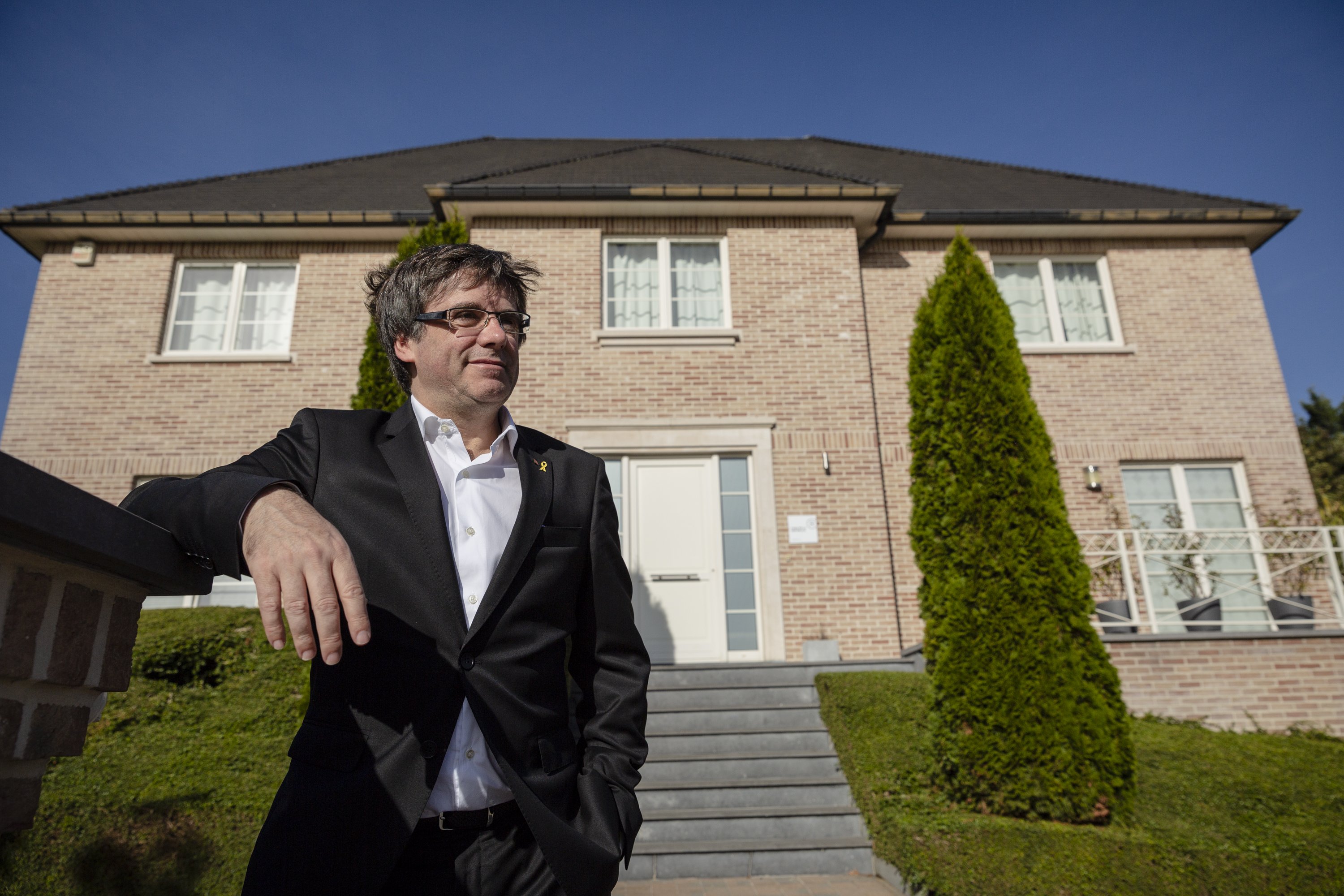Two days after the Catalan Parliament declared the independent Catalan republic, Carles Puigdemont (Amer, 1962) left for Brussels. The 'Jordis' had been in Soto del Real prison for two weeks, and then prime minister Mariano Rajoy, calling on article 155 of the Constitution, had just struck down Catalan self-governance. That's all now a year ago and, over these twelve months, the president has found himself pursued by two European arrest warrants and locked up in a German prison after being arrested as he returned to Belgium by car. In Waterloo this Tuesday, a quiet city to the south of Brussels, surprisingly sunny for mid-October, the president appears satisfied in this interview with El Nacional at being able to present a "service record full of results" and says that he wants to "continue fighting". His rival, however, is implacable.

Photo: Sergi Alcàzar
During the interview, he never lets his guard down. His hair is as chaotic as ever, but with more grey now; it's the only hint of improvisation shown by a very serious Puigdemont who's weighing up both his words and his gestures. He brings up issues of legal process to avoid questions about the anniversary of the declaration of independence and the events it led to. Nor does he reveal details from inside the Council for the Republic, wanting to save them for the 30th of this month. Currently, the focuses of his concern is the Crida Nacional (National Call) and the need to preserve the unity of the independence movement.
The Call starts this Saturday...
Exactly.
The Call is born with the vocation of disappearing
What's its objective?
The Call is a tool which is born with the vocation of disappearing, and which aims for the period of its survival or life to be as short as possible, because its purpose is to bring together as much strength as possible towards Catalan society's main intention, which is to decide its own future, to constitute itself as an independent republic. This is a tool for that. As such, its calling is to disappear when this process has reached its end.
In the world of the 21st century, talking about parties is a little obsolete
Will the Call be a party?
It's a political actor. In the world of the 21st century, talking about parties, about classic ideologies, is a little obsolete. We need new tools, new languages, most likely new priorities. If we talk about a party, it's like talking about nationalism, about concepts which marked 20th century politics, but which aren't useful in the 21st century, in light of this new paradigm of organising democracy itself. It will do politics, obviously, and call on all parties. It's quite a new instrument, which doesn't ask anyone to renounce their activism; it's compatible to belong to the Call and any other political group. As such, it's a little difficult to say: will it be a party? Put like that, no. It includes a lot of movement, meetings between people who come from different political traditions and want to continue defending them.

Photo: Sergi Alcàzar
The launch of the Call seems to have created a certain confusion among the public and a certain muddle of terminology: PDeCAT, JxCat, JxRep, la Crida...
If that were the confusion: blessed confusion. It seems to me that we've got more worrying confusions at the moment than possible name changes. We're in the middle of a process, as a country, which is fairly innovative from all points of view: we want to become independent without a war of independence, we want to become independent by stages, appealing to [the idea of] the republic shared with the people who don't want independence, and moreover without breaking with either Europe nor its rule of law which we feel indebted to. Simple, it isn't; prior points of reference, there aren't any, we don't have the possibility of comparing ourselves with similar processes. As such, we necessarily have to be innovating too in some way and making contributions which, by the way, I think are interesting in the European political debate. The same thing happens in politics. We're seeing what's the best way to be able to crystallise the unity. We tried it with JxCat, I offered it myself. The way we made the electoral list already communicated this vocation for it to be across party lines. Whoever saw in it the rebranding of [the old party] Convergència was wrong. What's more, that's what the results say. Could that generate a point of confusion? Okay. Maybe. But what prevails is the point of hope and the management of this hope. The Crida's national convention, I think, will answer many of these worries and questions. What the people decide at the convention will be what the Call will be. For us, it's very important that a few pieces of wicker come out of this convention to make this basket, and to not preconceive it beforehand. Does that have a risk that it could create a point of confusion? I believe that it's minor compared with the potential it has, the hope of being able to do something different, new and truly useful at this time.
How are relations with ERC? Specifically, with Oriol Junqueras? It's a recurring question, but there's a sense there's a coldness between you two and that it's growing...
Oriol is in prison and I'm in exile. To hope we would have the fluid relationship we had before, is even quite unjust because it's to not understand the circumstances of our lives, which are very hard and very difficult. I try to have periodic contact with them, and naturally even more with the president of my parliamentary group [Jordi Sànchez], even though they're in prison. That's not easy, but I more or less keep up all the contact I can with the people in Lledoners [as well as] Carme Forcadell and Dolors Bassa.
But you've not been able to speak with them?
No. I've not been set up to able to speak with them. I've exchanged letters with most of them, I've sent them all letters. A week and a half ago, I sent dedicated copies of my book with a letter to each of them. With Dolors I have a personal relationship beyond our political similarity, [she's] a person from Torroella with whom I share geographical reference points... And naturally with Jordi Sànchez, [Quim] Forn, [Josep] Rull, [Jordi] Turull, Jordi Cuixart... We logically have a close relationship within these circumstances. I'd love to be able to speak with them, to be able to meet with them in person. With all of them, with Oriol, with Carme, Raül [Romeva], with all of them.

Photo: Sergi Alcàzar
With Marta Rovira you can have an easier relationship...
We met when I travelled to Switzerland, we've spoken three or four times by videoconference, we keep in contact through other people... I want to be respectful of her personal decisions, she's refocusing her life in Switzerland, she's got her family there, you've got to be respectful of people's rhythms. I will do all I can to help her in everything I can.
And with vice-president Aragonés? He's ERC's normal contact with the Catalan government.
I'm aware he's got a regular relationship [with her]...
His relationship with you...
He's never come here. In any case, it's a question he's got to answer, not me.

Photo: Sergi Alcàzar
One conflict there's been in recent weeks in the Catalan Parliament is over the matter of delegating votes. It's caused a episode of tension between ERC and JxCat which people haven't quite understood...
I believe our position has been clear and is well understood. We didn't want to be either suspended or substituted and this is our collective line of defence. I believe that put like that it makes sense.
You're not interested in being a candidate for anything, say municipal or European elections?
No. Nor to be a candidate in Flanders.
Would it be compatible being a candidate with remaining in the Parliament?
I've not looked into it. That's how little interest I've got.
Will you stand again in a Parliament election?
The ideal would be to not, because that would mean that we've run out the legislature, that it's gone well for us, that there are new leaders making progress who I believe are who who have to lead new stages in the country and, as such, the ideal would be not.
We didn't want to be either suspended or substituted and this is our collective line of defence
Will the legislature last its whole mandate?
I hope it will last, we've got the mandate and the parliamentary strength to make it possible. And if there's no external interference, some abusive judge interfering in the sovereign decisions of a Parliament, I believe we can manage it. It won't be easy, but we have to propose lasting the legislature, because it's the way that the whole process we have to go through outside of the institutions can go ahead.

